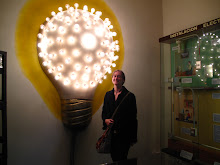It's hot out tonight. Sticky. I'm completely exhausted but I can't sleep. Woke up at 7 this morning, went to the gym, then spent 3 hours wandering the West Village/High Line Park with a friend. May post later on the park...
Saw a show today that makes me wonder why we put things on stage in the first place. It was definitely quality, well written, acted, directed, produced. Riveting even. And deeply disturbing. Curdled the pit of my stomach. I wanted to leave the theater, or at least look away, but I couldn't. By the moment of crisis, I was convinced I was about to see someone kill themselves quite bloodily on stage, and I really cared (to the writer's credit, he fooled me well).
But I'm getting ahead of myself. Some backstory:
"Whore," by Rick Viede, documents an unlikely friendship between sex workers, a novice who is increasingly haunted by a ghastly series of murdered prostitutes, and an expert who descends into kink, self-loathing and a neurotic obsession with saving money. The way Viede plays the audience off the two main characters is brilliant: you don't see the play truly through the eyes of either one (despite a couple of monologues), and only know what they tell each other about themselves. Like the characters, your footing becomes less and less certain as the play moves forward. The urgency and fear becomes more and more heightened, until, like it or hate it (and there were plenty in the audience that seemed to hate it), you're enthralled.
Right after the show, I was still too full of emotion to think about what I had just seen, but now I can't help wondering what the whole point of it was; "Whore" does the thriller genre so well that you forget to ask. Unfortunately, it doesn't end as a thriller like, for example, "Veronica's Room." The crisis resolves ambiguously, offstage somewhere, and both characters rise above their circumstances, also ambiguously, offstage somewhere. Of course, to tell you this completely spoils the entire effect, but the show closes this weekend and no one reads this blog anyway (I dare you, reader, if you're actually out there, to comment!) so I don't feel too bad about it. I don't actually remember very much about the final scene, because I was preoccupied trying to catch my breath and settle my stomach, but as far as I can tell Tim and Sara both just sort of get over it and move on. Flash forward in time, and they each monologue as well-adjusted adults. Really?
So then my question becomes, why tell this story at all? If it's for the sheer morbid novelty (valid in its own right) then the ending betrays the piece. If it's to document the character's personal evolution, then it would be better served by ending with a continuation or resolution of the immediate story, rather than just informing the audience third-person that there was one. If it's public therapy for the writer (who claims to have based it mostly on people he met while backpacking around the world, as well as some autobiographical content), then I certainly don't want to get deeper into his head than I already am, and probably won't look out for him in the future.
I don't know the answer, but it's still bugging me at 2am: why put this piece on stage?
It's also in interesting juxtaposition with another highly visceral piece I saw in Chicago, but that's probably a subject for another blog: intentional, intellectual participation vs. unintentional, emotional participation. Yep, that's a whole nother can of worms.
This is the Sort of Thing that Keeps Me Up Nights (yep, big geek, and too fond of parentheses to boot).
Posted by
Stephanie
on Friday, July 17, 2009

0 comments:
Post a Comment